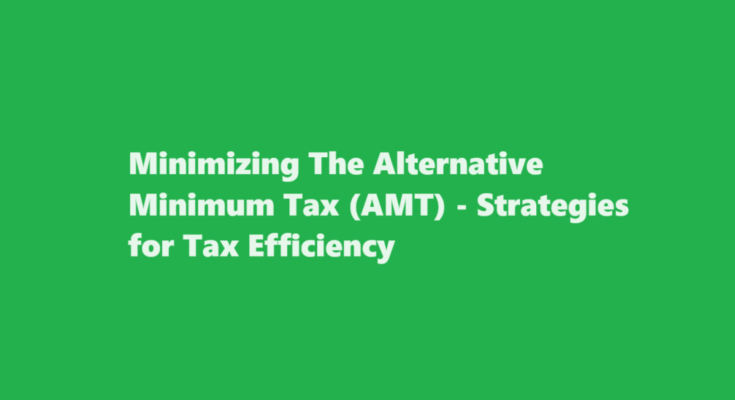Introduction
The Alternative Minimum Tax (AMT) is a parallel tax system in the United States that was originally designed to ensure that high-income individuals and corporations pay their fair share of taxes. However, it has increasingly affected middle-class taxpayers due to its complex rules and thresholds. Minimizing the AMT is a goal for many individuals and businesses, as it can help reduce their overall tax liability. In this article, we will explore strategies to minimize the impact of the AMT and optimize tax efficiency.
Understanding the AMT
Before delving into strategies to minimize the AMT, it is crucial to understand how it works. The AMT is calculated by adding back certain tax deductions and credits that are allowed under the regular tax system. If the AMT exceeds the regular tax liability, the taxpayer must pay the higher of the two. Some of the common adjustments that trigger the AMT include
1. State and local taxes: Under the regular tax system, you can deduct state and local income taxes. However, these deductions are not allowed under the AMT, increasing the likelihood of triggering it for those living in high-tax states.
2. Miscellaneous itemized deductions: These include deductions for investment expenses, unreimbursed employee business expenses, and tax preparation fees. They are not allowed under the AMT.
3. Incentive Stock Options (ISOs): When you exercise ISOs, the difference between the exercise price and the fair market value of the stock is included in your AMT income.
4. Depreciation and depletion: The AMT requires slower depreciation schedules for certain assets, which can lead to higher income subject to the AMT.
Minimizing the AMT
Now, let’s explore several strategies to minimize the AMT and optimize tax efficiency
1. Use the AMT Exemption: The AMT exemption amount is a certain income threshold under which you won’t be subject to the AMT. Utilize this exemption to the fullest extent by optimizing your income to stay below it. For married couples filing jointly, the exemption was $113,400 in 2021.
2. Manage State and Local Taxes: Consider strategies to reduce your state and local tax liabilities, such as moving to a lower-tax state or structuring your income in a way that minimizes these deductions. Keep in mind that some states have high property taxes, so managing real estate holdings can be essential.
3. Carefully Time Your Deductions: Timing is crucial when it comes to minimizing the AMT. Consider delaying certain deductions to years when you are not subject to the AMT. For example, postpone making large charitable contributions or paying property taxes until you’re sure you won’t be subject to the AMT.
4. Optimize Investment Choices: Be mindful of investments that may trigger the AMT, such as Incentive Stock Options (ISOs). Diversify your investments to include non-AMT-triggering options like Non-Qualified Stock Options (NQSOs) or mutual funds.
5. Maximize Tax Credits: Tax credits can help offset the impact of the AMT. Look for opportunities to claim credits like the Child Tax Credit or the Earned Income Tax Credit (EITC), which can directly reduce your tax liability.
6. Contribute to Retirement Accounts: Contributions to retirement accounts like 401(k)s and IRAs can reduce your taxable income, potentially pushing you below the AMT threshold. Maximize your contributions to these accounts to lower your overall tax liability.
7. Plan Your Capital Gains: Timing your capital gains can significantly impact your AMT liability. Capital gains are subject to the AMT, so consider selling assets strategically to minimize the gain in high-AMT years and take advantage of lower rates in other years.
8. Utilize Tax-Advantaged Accounts: Invest in tax-advantaged accounts, such as Health Savings Accounts (HSAs) and 529 plans for education expenses. These accounts offer tax benefits under both the regular tax system and the AMT.
9. Seek Professional Guidance: Given the complexity of the AMT and its interaction with other aspects of your financial situation, it’s advisable to consult with a tax professional who can help you navigate the nuances of your specific circumstances.
FREQUENTLY ASKED QUESTIONS
What deductions are not allowed for AMT?
Line 2a: Standard deduction or deductible taxes from Schedule A: In calculating the AMT, you cannot take itemized deductions for state and local income tax, real estate taxes and personal property taxes, even though these are deductible on your regular return.
How to minimize AMT on ISO?
The easiest way to avoid AMT on ISO stock options is to exercise your shares early in the year, typically in January. This gives you the entire year to decide what to do. As you near year’s end, determine your tax liabilities and if selling the shares in the same calendar year makes sense.
Conclusion
Minimizing the Alternative Minimum Tax is a goal for many taxpayers, as it can lead to substantial tax savings. Understanding the AMT, optimizing deductions, managing investments, and using tax-efficient strategies are key to minimizing its impact. By carefully planning your financial activities and seeking professional guidance, you can reduce your AMT liability and improve your overall tax efficiency. It’s essential to stay informed about changes in tax laws and adjust your strategy accordingly to make the most of available deductions and exemptions while staying in compliance with tax regulations.
Read Also : Evolving Togepi – A Journey of Friendship and Growth



